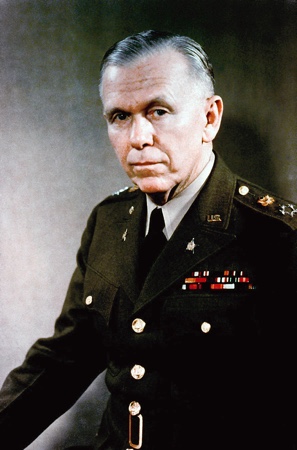George Marshall Is More Relevant than Ever

June
5th is the 70th anniversary of the greatest commencement speech ever.
On that day, Secretary
of State George Marshall did so much more than give words of wisdom
to graduating Harvard University students.
Marshall
delivered words for peace that would feed and rebuild Europe from the
ashes of World War II. His words can mean as much today as they did
back in 1947, if we listen. For we need such wisdom to guide us in
defeating today’s greatest threat: terrorism.
No one
at Harvard knew that history was being made that day in
1947. For Marshall’s speech was the basic outline for a European
recovery program. It led to the Marshall Plan, approved by Congress
the following year, which sent billions in aid to Europe for their
reconstruction.
The Marshall Plan was
America's humanitarianism at its finest. It gave nations what they
need to be free, have a strong economy, and be at peace.
As
Marshall said in his speech "Our policy is directed not against
any country or doctrine but against hunger, poverty, desperation and
chaos. Its purpose should be the revival of a working economy in the
world so as to permit the emergence of political and social
conditions in which free institutions can exist."
Many
nations were strengthened by the Marshall Plan so they could resist
outside forces like Communism, which was spreading in
the post-war world.
But one thing we
must remember about the Marshall Plan is that it could never have
succeeded without food. That is why hunger is highlighted in
Marshall’s speech as one of the enemies our policy must
be directed against.
This is especially relevant
today with hunger being a threat to the stability of many
nations.
Marshall, in addition to being Secretary
of State, was also a member of President Truman's Cabinet Committee
on World Food Programs. Feeding the hungry was a top priority of the
administration.
It’s a good thing, too.
For what happened in Europe after the Harvard speech threatened to
derail the Marshall Plan even before it got off the ground. Severe
drought struck that summer. Crops could not grow in Europe and other
areas leading to more food shortages as winter approached.
An
emergency interim aid food package was approved for Austria, Italy
and France. As Marshall told Congress we had to "provide the
supplies necessary to permit the people of these three countries to
continue to eat, to work, and to survive the winter."
The
American public did its part too by collecting food donations via the
Friendship Train, CARE packages, the Silent Guest program, Catholic
Relief Services food collections, and so many other charitable
events.
The end hunger first mentality is something we
could desperately use today if we want to defeat terrorism.
The
countries where terrorism thrives also suffer immensely from hunger
and malnutrition. Afghanistan, Syria, Iraq, Mali, Somalia andYemen
are just some of the nations where terrorism has grown amid
hunger and chaos. The nations affected by Boko Haram’s evil reign
of terror in Africa are also fighting off famine.
According
to the US Famine Warning System there are 45 nations
needing emergency food assistance. South Sudan, Yemen, Somalia and
Nigeria are at the greatest risk of famine.
What
hope can the people of these countries have if they are starving? How
can they possibly have the strength to resist and drive out evil
influences like terrorism?
That is why we must
help nations overcome hunger if we want them to build peace and be
free from terrorist infiltration.
As the UN World Food
Programme (WFP) director David Beasley says, “ending
hunger is the greatest counter-terrorism effort in the world.”
Rick
Leach of the WFP USA adds, “We
invest in food security because violence feeds on hunger.”
We
should provide these countries with food assistance to get through
emergency times. We should build up their agriculture and local food
production. Like the Marshall Plan we should provide long-term
solutions, getting economies and self-sufficiency for these
nations.
This would take a dramatic shift in current
U.S. policy, which has been emphasizing less foreign aid.
There have even been proposals to eliminate food
assistance. This would be a tragic mistake.
We
must instead realize that not every struggle is going to be won
through military action, something Marshall understood
well.
Humanitarianism is our greatest tool for
peace. The Marshall Plan is a reminder of timeless principles that
can always guide us "against hunger, poverty, desperation and
chaos.”